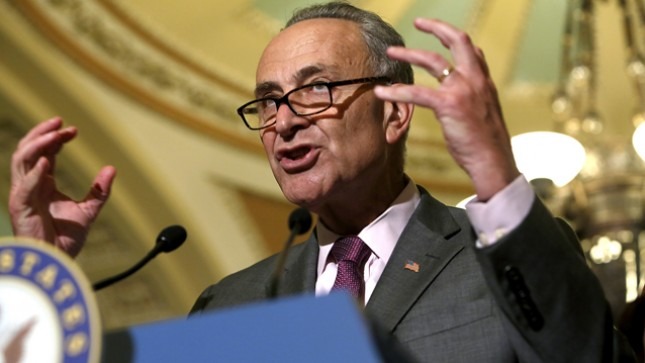(Charles Schumer | Source: Greg Nash via The Hill)
Last month, I wrote that the shutdown was a symptom of a much deeper problem with how Congress is functioning in the age of permanent obstructionism, one that had been apparent since the triggering of the previously unthinkable consequences of budget sequestration.
By analogy to Cold War game theory, I proposed that the shutdown (and the sequester, before it) demonstrated that Congress is no longer a negotiation between parties with counterbalancing interests and concerns. Legislators are now in a dangerous game in which one side is quite willing to detonate the entire edifice, simply to destroy the other.
| A small change to the debt-ceiling law could prevent future brinkmanship. Critics say it would take the power of the purse away from Congress. It wouldn’t. |
Recently, Senate Democrats, led by Charles Schumer of New York, made an attempt to break out of that destructive spiral. They proposed legislation that would automatically renew the debt ceiling. The Senate plan works like this: the president will be able to unilaterally increase the debt ceiling by executive decree, but this decree would be subject to override by Congress—requiring a nearly unthinkable two-thirds majority.
“If we were to do that, the chances of going up to the brink again, the chances of this kind of debacle, would decrease,” Schumer said. Game theory suggests that is exactly right.
Critics have claimed that this move would take the “power of the purse” away from the House, but it does no such thing: the House is still in charge of enacting spending legislation—what they would no longer be able to do is promise to spend money and then refuse to allow the Treasury to obtain that money. This two-step process, nearly unique among developed nations, serves absolutely no functional purpose other than to allow members of Congress to have it both ways: they can vote for the specific spending allocations that their backers want, while grandstanding against spending-as-such. This ability to manipulate the framing of ones actions without aligning the content is exactly the sort of asymmetry that allows a small cadre of ideological extremists to hijack the legislative process.
If enacted, this legislation would unquestionably be a positive step in the direction that I laid out. Unfortunately, the bill faces an uphill battle. Despite the fact that the proposed rule is extremely similar to one made by Republican Senate leader Mitch McConnell in 2011—it is, in fact, known as the “McConnell Rule”—House and Senate Republicans have already voiced opposition.
But the fact that such a plan is at least being considered is a positive sign that some legislators realize that they are locked into a “Prisoner’s Dilemma” with unrepentantly noncooperative players. That the focus has shifted away from satisfying these elements—and towards structural shifts that limit their ability to do damage—gives hope that Congress may soon figure out how to change the game.
Aaron Bornstein is an independent writer living in New York City.







0 Comments